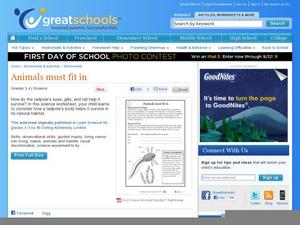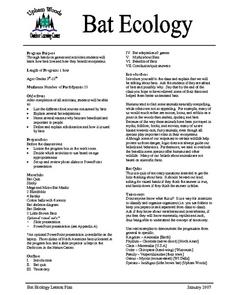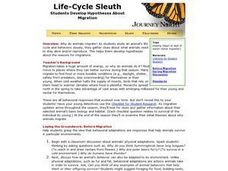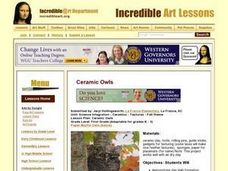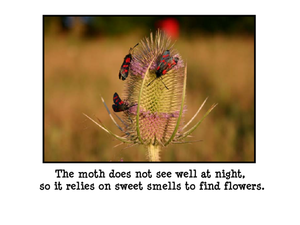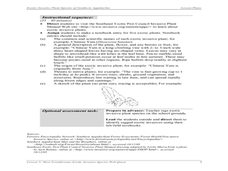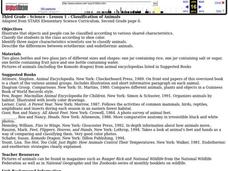Curated OER
The Earth's Rain Forests
Learners study the importance of the world's rain forests. In this rain forest lesson plan, students read about the role of the rain forests in the world's environment. Learners then write a formal letter to a member of Congress or...
Curated OER
Nest Construction and Area Management Activities
Students construct a nest for a fictitious ground-nesting bird.They create models of the bird (along with its eggs) that might theoretically live in this habitat. They write in a daily journal about what happens to their nests in a...
Curated OER
In Your Own Backyard
Students observe organisms in their habitat and record their observations. They then draw conclusions about the organism's habitat needs and food sources.
Curated OER
Animal Playing Cards
Young scholars research animal characteristics including information about mammals, reptiles, birds, and fish. They place the information into a database and then, create playing cards using the information.
Curated OER
Dull Duck, Dashing Duck
Students examine the different colors and patterns found on animals bodies, specifically birds. Through discussion, students discover the use of the colors and patterns for protection from predators and the advantages while hunting prey,...
Curated OER
Teeter Totter
Students explore the two types of spotted sandpipers. They create a puppet show using the spotted sandpiper from Puerto Rico and the spotted sandpiper from Alaska. Students research the habitats of the two sandpipers.
Curated OER
Animals Must Fit In
A instructional activity on tadpoles is here for your young biologists. Learners read a short paragraph on tadpoles, then answer three questions regarding how parts of their bodies help the tadpole to survive in the pond. There is a good...
Curated OER
Wetland Metaphors
Students describe the characteristics of wetlands and identify their ecological functions. They inspect items and use them to create metaphors about wetlands.
Curated OER
Prairie Mural Project
Seventh graders construct a large mural of a praire showing plants, and animals that would live there.
Curated OER
Animals Antonyms and Synonyms Worksheet
Create a cross-curricular connection for your upper elementary language arts kids. There are 15 vocabulary words listed in the chart, and each has to do with exploring different ecosystems. For each word, the learner must find an antonym...
Curated OER
Bat Ecology
Students, through hands on games and activities, discover how bats live and how bats benefit ecosystems. They play a game designed to show them how echolocation works and another to show how mother bats locate their young through their...
Curated OER
Life-Cycle Sleuth
Students analyze an animal's life cycle and behaviors, and examine what animals need to stay alive and reproduce. They develop theories and hypotheses about the reasons for migrations, using the Journey North online project.
Curated OER
Ceramic Owls
Students creat owls through the use of slabs of clay with pinched beak and tufts. They use a clay tool or nail to add shape to mak wings. Students use shells, and other items to create texture. After the creations have dried, students...
Curated OER
What's Wild
Third graders discover the differences between wild and domestic animals. In this animal lesson plan, 3rd graders chart the differences in the animals and look through magazines for pictures of wild and domestic animals to glue to a...
Curated OER
Rain Forest Animals
Young scholars create a book about animal species found only in the Amazon rain forest. They find one species to represent each letter of the alphabet, and write each name on a different piece of paper. They illustrate each page with an...
Curated OER
Winter Survival
Students examine what animals need in order to survive. In this investigative lesson students play a "role" of an animal in winter.
Curated OER
Smarty Plants
Students examine plants and pollinators. In this plant biology lesson, students read The Power of Pollinators and identify the parts of the plant and the pollinators. Students design their own imaginary plants.
Curated OER
VERTEBRATES
Seventh graders describe the main characteristics of warm-blooded vertebrate animals. They compare and contrast the two different groups of warm-blooded vertebrate animals by looking at external, reproductive, and growth characteristics.
Curated OER
Matching Science Words and Definitions About Animals
In this matching science words and definitions about animals worksheet, students match fifteen science words about animals with the definitions.
Curated OER
Animals Alphabetical Order
In this animals worksheet, students put names of animals into alphabetical order. Students put 15 animal names into alphabetical order.
Curated OER
Critter Encounter Chart
Young scholars record data found at an assigned web site. In this data collection lesson, students access an assigned web site in order to complete a data chart about animals they see. They travel to different sections of the web site to...
Curated OER
Most Troublesome Exotic Invasive Plant Species Web Quest
Students participate in a Web Quest activity in which they identify common exotic invasive plant species of the Southern Appalachian Region. After identifying the top 10 exotic invasive species, they choose one to research in depth.
Curated OER
Classification of Animals
Third graders practice classiyfying items and identify three major characteristics scientists use to classify animals. They describe the differences between ectothermic and endothermic animals.
Curated OER
Hawaii's Migratory Animals
Students act as travel agents to plan a trip for a migratory animal. They conduct research and design a travel brochure that includes a migratory route, illustrations of planned stopovers and special tourist attractions the animal might...






